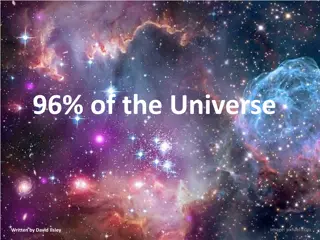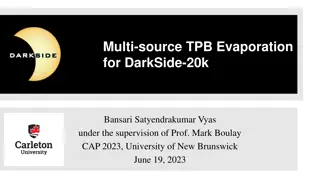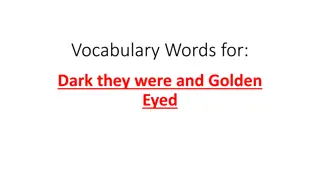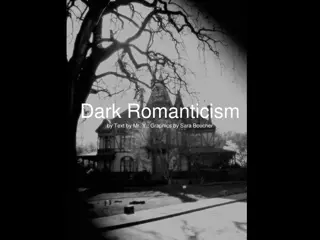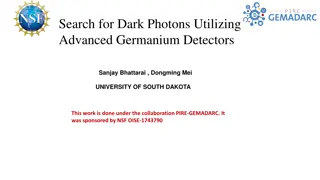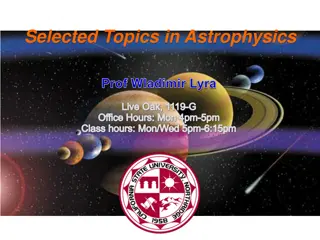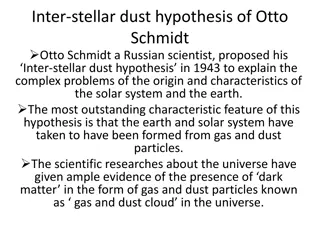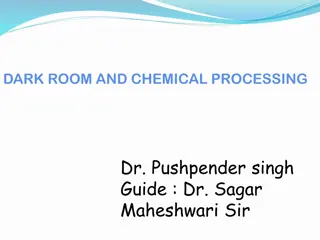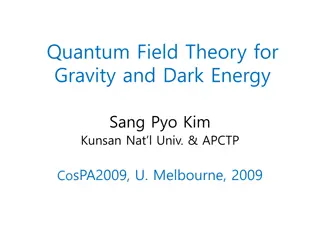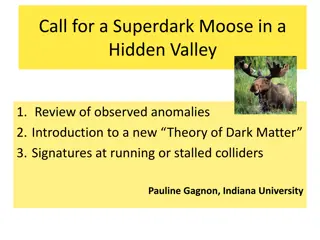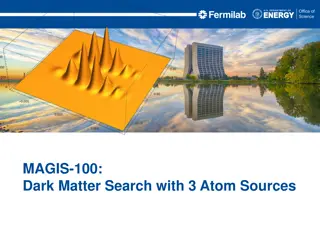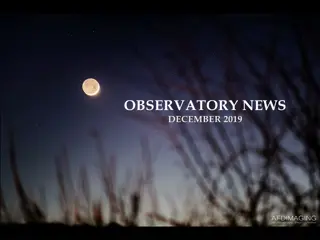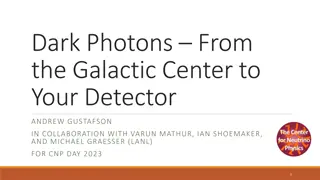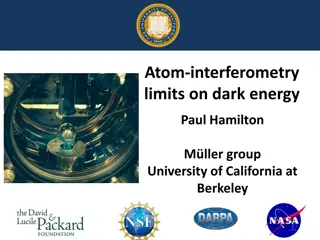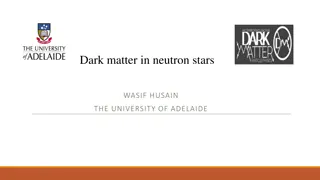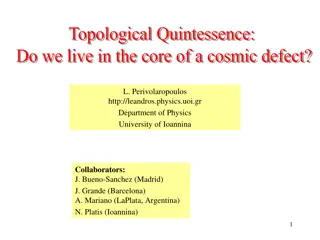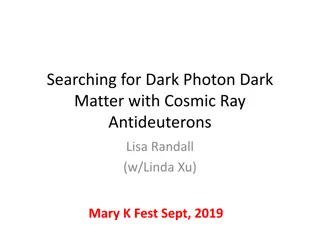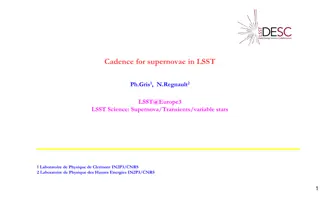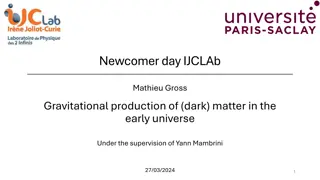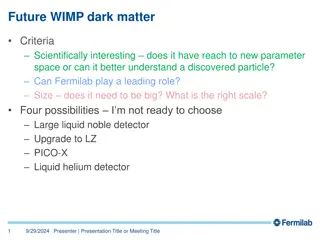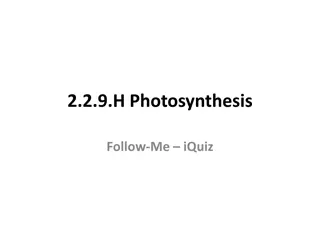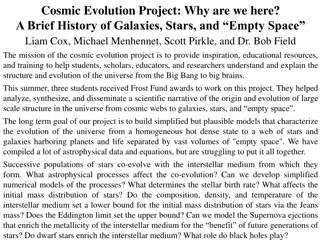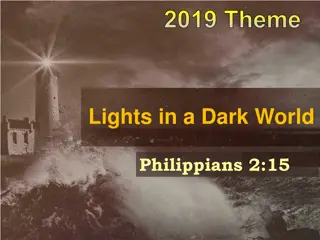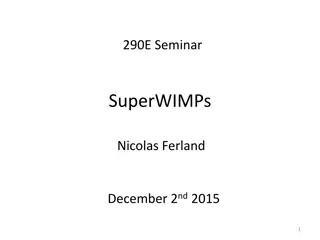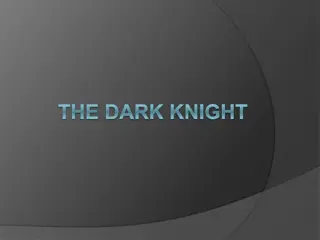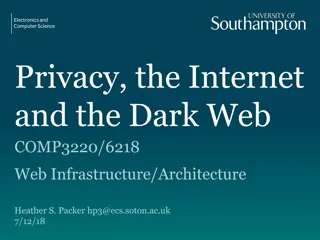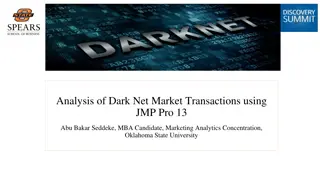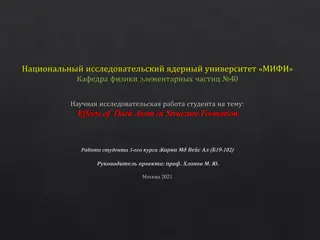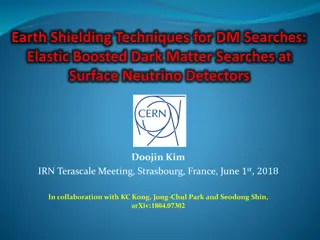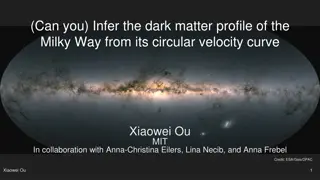Dark Matter Search with ATLAS: Active Learning Application
Explore an active learning application in the search for dark matter using ATLAS PanDA and iDDS. Investigate Beyond Standard Model physics parameters related to Hidden Abelian Higgs Model and New Scalar with a focus on cross-section limit calculations. Understand the process for generating Monte Car
0 views • 16 slides
Exploring Dark Sector Particles at Fermilab PIP-II and Beyond
The DAMSA experiment at Fermilab PIP-II aims to search for Dark Sector Particles (DSP) using a high-intensity proton beam facility. By focusing on Axion-like particles and employing specific physics strategies, DAMSA seeks to penetrate the low mass regime and discover rare particles in unexplored ki
6 views • 22 slides
Experience Nashville After Dark: Night Tour Adventure
Discover the vibrant nightlife of Music City with our Nashville Night Tour. Led by knowledgeable guides, this immersive experience takes you through iconic landmarks, lively entertainment districts, and hidden gems illuminated by the city lights. From honky-tonks to historic sites, immerse yourself
3 views • 7 slides
Exploring the Composition of the Universe
The universe is a vast expanse consisting of various components. Only 0.4% comprises galaxies, while hydrogen, helium, protons, neutrons, and electrons make up 4%. The remaining 96% includes photons, neutrinos, dark matter, and dark energy. Photons, fundamental particles of light, exhibit different
0 views • 30 slides
Advanced Technology in Dark Matter Research
Cutting-edge technologies such as multi-source TPB evaporation, LAr TPC, and DarkSide-20k TPC are being utilized in the study of dark matter. These technologies aim to enhance detection sensitivity and uniformity in film coatings, crucial for advancing our understanding of mysterious dark matter par
1 views • 20 slides
Enter Company and State Names with EIT Toolkit Colors
This content showcases image objects associated with various company and state names, along with EIT Toolkit colors mentioned for Dark Blue, Light Gray, and Dark Green. The images provide a visual representation of the entities mentioned, complemented by the color information from the EIT Toolkit.
2 views • 5 slides
Vocabulary Words: Dark They Were and Golden-Eyed
Explore the meanings of words such as "amiss," "bewildered," "dwindle," "forlorn," "perspire," "villa," "recede," and "flimsy" with sentences from a text describing a dark and golden scene reflecting sadness, confusion, and more. Expand your vocabulary and understanding of these terms.
0 views • 13 slides
Dark Romanticism: Exploring a Gothic Literary Sub-genre
Overview of Dark Romanticism, a literary sub-genre emerging from the Transcendental movement but notably less optimistic. Explore its characteristics focusing on the tragic, characters prone to sin and self-destruction, and nature depicted as dark and mysterious. Learn about notable authors like Edg
0 views • 11 slides
Dark Setting and Character Dynamics in "All the Light We Cannot See
The setting of Zollverein in "All the Light We Cannot See" reflects a stark contrast between life and death, impacting the childhood of characters like Werner and Jutta. The dark imagery and ominous tone created by Anthony Doerr reveal the characters' struggles amidst a grim environment, highlightin
1 views • 13 slides
Search for Dark Photons Utilizing Advanced Germanium Detectors at University of South Dakota
Research at the University of South Dakota under the collaboration PIRE-GEMADARC focuses on developing advanced germanium detectors with low energy thresholds for detecting low mass dark photons. The study aims to optimize event detection using new Ge detectors with internal charge amplification. Th
0 views • 16 slides
Exploring Fascinating Topics in Astrophysics
Delve into intriguing subjects like Galactic Rotation Curves, Mass to Luminosity Ratio, Low Surface Brightness Galaxies, Dark Matter Haloes, and the Bullet Cluster. Discover how observations and Big Bang nucleosynthesis help us understand dark matter in the universe.
1 views • 10 slides
The Interstellar Dust Hypothesis of Otto Schmidt Explained
Russian scientist Otto Schmidt proposed the Interstellar Dust Hypothesis in 1943 to explain the origin of the solar system and Earth. According to this hypothesis, gas and dust particles from the universe formed our solar system. The dark matter in the form of gas and dust clouds played a crucial ro
3 views • 5 slides
Setting Up a Dark Room for Safe and Efficient Film Processing
A dark room is essential for handling and processing film without the risk of fog due to light exposure. Learn about the wet and dry sides of the darkroom, equipment needed, design considerations, and lead shielding requirements if adjacent to an X-ray room.
1 views • 83 slides
Exploring Quantum Field Theory for Gravity and Dark Energy
Delve into the fascinating realms of quantum field theory as applied to gravity and dark energy, unraveling the mysteries of the universe through concepts like vacuum energy, cosmological constants, and dark energy models. Discover the interconnected web of theories concerning the early universe, in
0 views • 27 slides
Unveiling Dark Matter: An Exploration Beyond the Standard Model
Delve into the intriguing realm of dark matter through observed anomalies, a new theory introduction, and collider signatures. Uncover evidence of dark matter's existence through phenomena such as the bullet cluster, weak gravitational lensing, and unexplained astrophysics anomalies. Join the quest
2 views • 43 slides
Cutting-Edge Dark Matter Search with MAGIS-100 Gradiometers
Cutting-edge dark matter search using the MAGIS-100 instrument with three atom sources is discussed in detail. The configurations, interferometer phases, and data analysis techniques are explored to maximize the efficiency of detecting dark matter signals. The study also delves into exploiting corre
1 views • 10 slides
Exploring Dark Matter in Southern Hemisphere with PAUL Project - A Scientific Journey
Join the PAUL project team as they delve into the search for dark matter in the Southern Hemisphere at L'Aquila, Italy. Discover operational underground labs, historical milestones, new developments, and future projects in South Africa. Explore the collaboration with world-class universities and the
0 views • 25 slides
Observatory News December 2019: Lunar and Dark Sky Observing Sessions Schedule
In December 2019, the observatory presents a schedule of lunar and dark sky observing sessions. The sessions include Lunar Sessions on December 6th, 7th, January 3rd, and 4th, as well as Dark Sky Sessions on December 20th, 21st, 23rd, 27th, 28th, 30th, and January 3rd. It is advised to check their w
1 views • 14 slides
Dark Side of the Afterglow: Complications in Dark Matter and Rare Events Searches
Exploring the challenges in detecting dark matter and rare events due to energy accumulation, excitation clustering, and avalanche relaxation events. Discusses issues such as low-energy background, ionization load on detectors, dual-phase detectors, universal scenarios of energy accumulation, and en
0 views • 15 slides
Unveiling Dark Matter Mysteries Through Dark Photons
Delve into the exploration of dark matter through the lens of dark photons in the galactic center and detectors. Uncover the enigmatic nature of dark matter, its interactions, existing constraints, and our model with fermionic dark matter and a dark photon mediator. Discover strategies to evade cons
0 views • 18 slides
Limits on Dark Energy Using Atom Interferometry - UC Berkeley Study
Research conducted by Paul Hamilton Müller's group at the University of California, Berkeley, focuses on using atom interferometry to explore dark energy. The study delves into screened scalar fields as dark energy, future reach with atom interferometry, known unknowns related to dark energy densit
0 views • 39 slides
Exploring Neutralino Dark Matter Mass Limits
Hajime Fukuda, along with researchers Shirai and Luo, conducted a study on the maximum mass of Neutralino dark matter particles. They investigated coannihilation effects and how colored sparticles can enhance LSP annihilation. The study delves into the implications for TeV-scale supersymmetry models
0 views • 39 slides
Analysis of "The Dark Knight (2008)" and Its Noir Elements
Explore the intriguing elements of film noir in "The Dark Knight (2008)" through discussions on its neo-noir classification, performances like Heath Ledger's Joker, references to Batman, and director Christopher Nolan's portrayal of modern anxiety amidst a post-9/11 world.
0 views • 10 slides
Exploring Dark Matter in Neutron Stars
Investigate the interaction of dark matter within neutron stars, comprising approximately 25% of the universe's total matter. The nature of dark matter assumptions, its distribution within neutron stars based on fermionic or bosonic properties, and the implications for self-interacting fermionic and
0 views • 22 slides
Topological Quintessence: Anomalous Cosmic Anisotropies and Dark Flow Directions
The consistency of Cold Dark Matter (CDM) with observational data has improved over the past decade, but tensions remain with various cosmic anomalies such as preferred anisotropy axes and dark flow directions. Topological Quintessence, a physical mechanism proposed by L. Perivolaropoulos and collab
0 views • 26 slides
Searching for Dark Photon Dark Matter with Cosmic Ray Antideuterons
Exploring the use of cosmic ray antideuterons for dark matter detection is a promising avenue in astrophysics. Antideuteron searches offer a low-background environment, making them ideal for detecting certain types of dark matter particles. Unlike antiproton searches, which face significant backgrou
0 views • 30 slides
Exploring Light and Dark Themes in Steinbeck's Novella
Delve into the symbolism of light and dark in John Steinbeck's novella, analyzing how they are used to represent characters and themes. Understand the significance of characters associated with light and darkness, and explore the societal implications of these contrasts. Practice writing paragraphs
0 views • 4 slides
Cadence for Supernovae in LSST and Dark Energy Hubble Diagrams
This content discusses the cadence for supernovae observations in the Large Synoptic Survey Telescope (LSST) and presents Hubble diagrams related to Supernovae and Dark Energy research. The images and descriptions focus on cosmological aspects, distance moduli, observational strategies, and constrai
0 views • 21 slides
Academic Journey in High Energy Physics: Exploring Dark Matter Production in the Early Universe
Mathieu Gross embarks on a Ph.D. journey supervised by Yann Mambrini, focusing on gravitational production of dark matter in the early universe. His academic path includes studies at Ecole Polytechnique, with a Master's in theoretical physics and research on reheating and early universe dynamics. De
0 views • 5 slides
Future Prospects in Dark Matter Research at Fermilab
Exploring new avenues in the realm of dark matter research, Fermilab stands at the forefront with potential upgrades to their detectors, such as the LZ and PICO-X. The presentation delves into the scientific criteria influencing the choice of detectors, the pursuit of understanding dark matter and d
0 views • 6 slides
Understanding Photosynthesis: Role of NADP and Division into Light and Dark Stages
In photosynthesis, NADP plays a crucial role in carrying hydrogen into the dark stage for carbon dioxide reduction. The process is divided into light and dark stages where different components like chlorophyll, chloroplasts, and electron transfer mechanisms are involved. This division ensures effici
0 views • 50 slides
Unveiling the Cosmic Evolution: A Journey Through Galaxies, Stars, and Empty Space
Delve into the intricate story of the universe's evolution from its hot dense origins to the vast cosmic web of stars and galaxies. Explore questions on stellar birth rates, interstellar medium influences, and the role of dark energy. Follow the journey of three students working on the Cosmic Evolut
0 views • 30 slides
Shining Lights in a Dark World: 2019 Theme Reflections
Explore the call to be shining lights in a dark world as highlighted in Philippians 2:15. Reflect on the need to stand out, be vigilant, study truth, and love one another while navigating the challenges of this world. Embrace self-discipline, prayer, and being different in a world that often rejects
0 views • 21 slides
Exploring the Mysteries of Dark Matter and SuperWIMPs
Dark matter, detected only gravitationally, poses enigmatic characteristics and poses challenges in direct detection. Scientists search for interactions with particles, explore hypothetical undetectable forms, and consider production mechanisms. SuperWIMPs like NLSP and NLK decay into Dark Matter, k
0 views • 16 slides
Exploration of Film Techniques in "The Dark Knight
Delve into the intricate world of film techniques employed in the iconic movie "The Dark Knight," directed by Christopher Nolan. Explore how camera shots, costume design, character portrayal, lighting, special effects, mise-en-scene, and music contribute to creating drama, suspense, and an unforgett
0 views • 32 slides
Exploring Privacy on the Web: Understanding the Deep and Dark Web
Delve into the intricate world of internet privacy, from the surface web to the hidden realms of the deep and dark web. Discover the importance of safeguarding personal data online, the significance of the Deep Web's unindexed content, and the intricacies of the Dark Web accessible via specific soft
0 views • 25 slides
Analysis of Dark Net Market Transactions Using JMP Pro 13g
Explore the world of dark net market transactions through detailed analysis using JMP Pro 13g. The study delves into data collection, methods used for analysis, findings on popular transactions and origins, as well as text analysis of item descriptions. Discover insights into the underground economy
0 views • 10 slides
Exploring Dark Atom Effects on Structure Formation in the Universe
Overwhelming evidence points towards the existence of dark matter in the universe, with various theoretical models such as OHe atoms and Glashow's EIMP model proposed to explain its nature. Dark OHe atoms, consisting of 2 charged particles bound with primordial He nuclei, offer a unique perspective
1 views • 8 slides
Dark Matter Search at Terascale Meeting in Strasbourg
Doojin Kim presents research on non-relativistic dark matter search, focusing on weakly interacting massive particles (WIMPs) and generic boosted dark matter (BDM) signatures at the Terascale Meeting in Strasbourg. The study explores various scenarios and production models for detecting elusive dark
0 views • 24 slides
Revealing the Dark Matter Profile of the Milky Way
Xiaowei Ou and collaborators aim to infer the dark matter profile of the Milky Way by measuring its circular velocity curve. By utilizing stellar tracers and data-driven models for precise distances, they seek to improve our understanding of dark matter distribution in our galaxy. Their research inv
0 views • 54 slides



